Founded in 1938 and published semiannually by Sophia University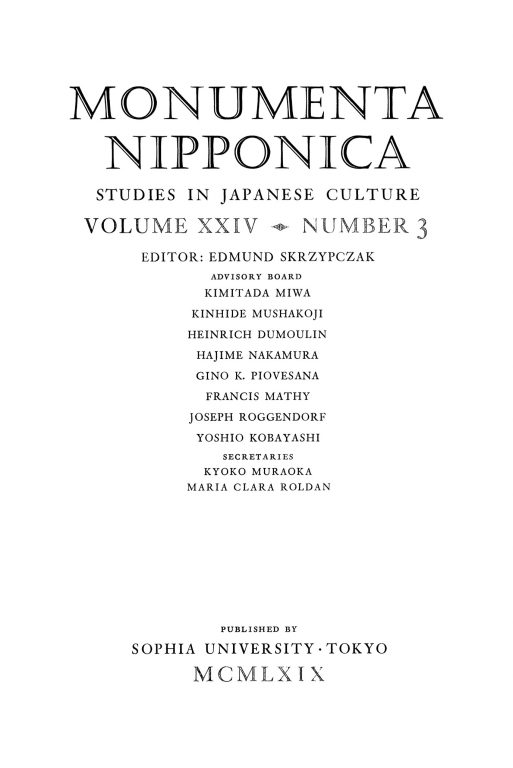 MN 24:3 (1969) 337–39I Can SpeakDazai Osamu, Translated by David J. Brudnoy and Kazuko Shimizu
MN 24:3 (1969) 337–39I Can SpeakDazai Osamu, Translated by David J. Brudnoy and Kazuko Shimizu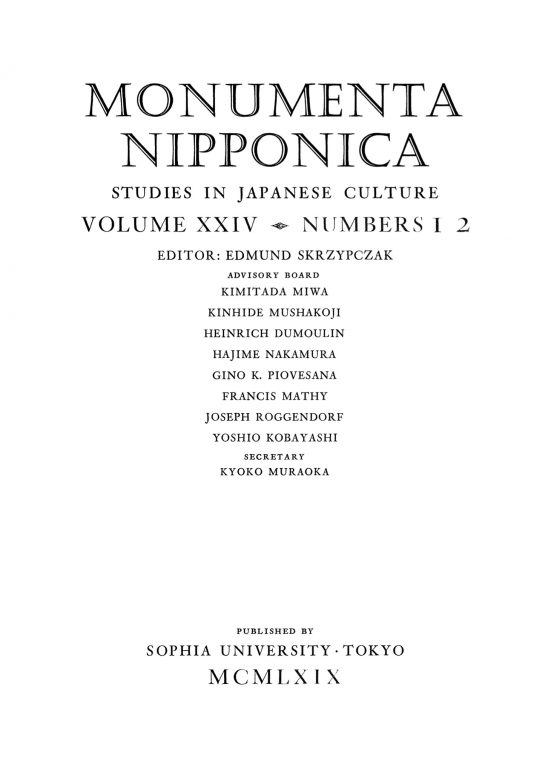 MN 24:1/2 (1969) 21–29Three Tanka-Chains from the Private Collection of The Emperor Kōgon’inKōgon (Emperor), Translated by William Ritchie Wilson
MN 24:1/2 (1969) 21–29Three Tanka-Chains from the Private Collection of The Emperor Kōgon’inKōgon (Emperor), Translated by William Ritchie Wilson MN 24:1/2 (1969) 169–79Sange (Fallen Flowers)Dazai Osamu, Translated by Thomas E. Swann
MN 24:1/2 (1969) 169–79Sange (Fallen Flowers)Dazai Osamu, Translated by Thomas E. Swann MN 24:1/2 (1969) 181–82Mangan (Fulfilment of a Vow)Dazai Osamu, Translated by David J. Brudnoy and Kazuko Shimizu
MN 24:1/2 (1969) 181–82Mangan (Fulfilment of a Vow)Dazai Osamu, Translated by David J. Brudnoy and Kazuko Shimizu MN 24:1/2 (1969) 183–85Matsu (Waiting)Dazai Osamu, Translated by David J. Brudnoy and Kazuko Shimizu
MN 24:1/2 (1969) 183–85Matsu (Waiting)Dazai Osamu, Translated by David J. Brudnoy and Kazuko Shimizu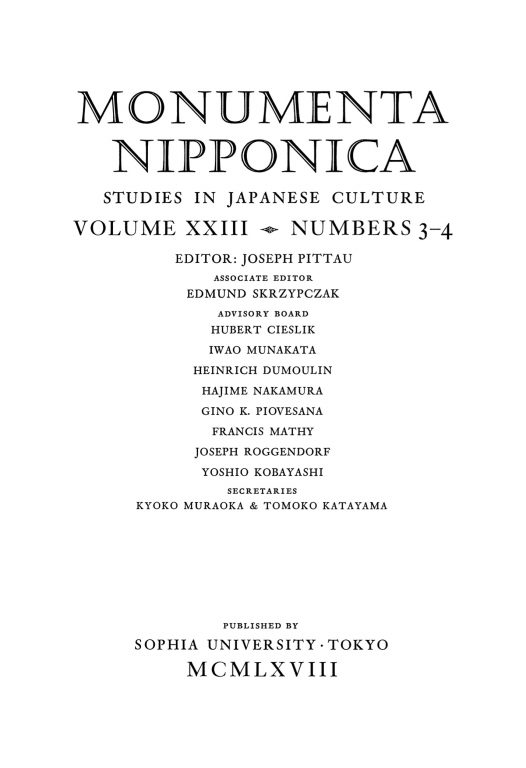 MN 23:3/4 (1968) 275–320Ancient Japanese Songs from The Kinkafu CollectionTranslated by Noah S. Brannen
MN 23:3/4 (1968) 275–320Ancient Japanese Songs from The Kinkafu CollectionTranslated by Noah S. Brannen MN 23:3/4 (1968) 351–430The MumyōshōKamo no Chōmei, Translated by Hilda Katō
MN 23:3/4 (1968) 351–430The MumyōshōKamo no Chōmei, Translated by Hilda Katō MN 23:3/4 (1968) 485–95Futari KomachiAkutagawa Ryūnosuke, Translated by Thomas E. Swann
MN 23:3/4 (1968) 485–95Futari KomachiAkutagawa Ryūnosuke, Translated by Thomas E. Swann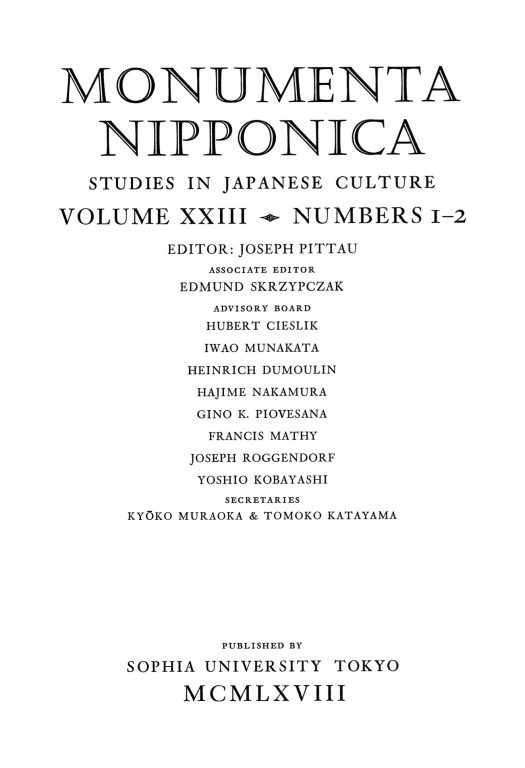 MN 23:1/2 (1968) 102–55The Azuma kagami account of the Shōkyū WarTranslated by William H. McCullough
MN 23:1/2 (1968) 102–55The Azuma kagami account of the Shōkyū WarTranslated by William H. McCullough MN 23:1/2 (1968) 156–86Kokuze sanron: The Three Major Problems of State Policy. Recorded in the 1st Year of Man’en (1860) at Fukui, Echizen ProvinceD. Y. Miyauchi and Yokoi Shōnan, Translated by D. Y. Miyauchi
MN 23:1/2 (1968) 156–86Kokuze sanron: The Three Major Problems of State Policy. Recorded in the 1st Year of Man’en (1860) at Fukui, Echizen ProvinceD. Y. Miyauchi and Yokoi Shōnan, Translated by D. Y. Miyauchi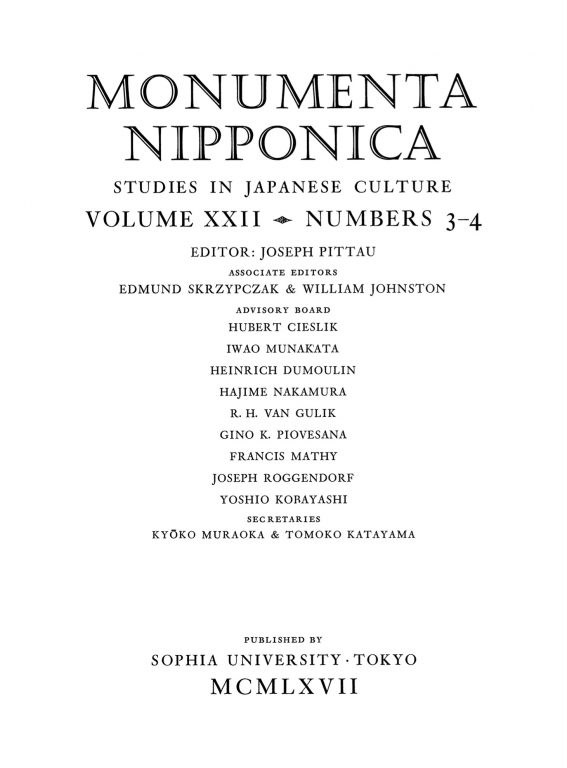 MN 22:3/4 (1967) 390–401“Dual Sovereignty”: Under the Japanese Shogunate as Interpreted by French Writers of the Eighteenth CenturyJacques Bésineau, Translated by Patrick O'Flanagan
MN 22:3/4 (1967) 390–401“Dual Sovereignty”: Under the Japanese Shogunate as Interpreted by French Writers of the Eighteenth CenturyJacques Bésineau, Translated by Patrick O'Flanagan MN 22:3/4 (1967) 468–81Discussion of Violent Revolution, From a Jail CellKōtoku Shūsui, Translated by George Elison
MN 22:3/4 (1967) 468–81Discussion of Violent Revolution, From a Jail CellKōtoku Shūsui, Translated by George Elison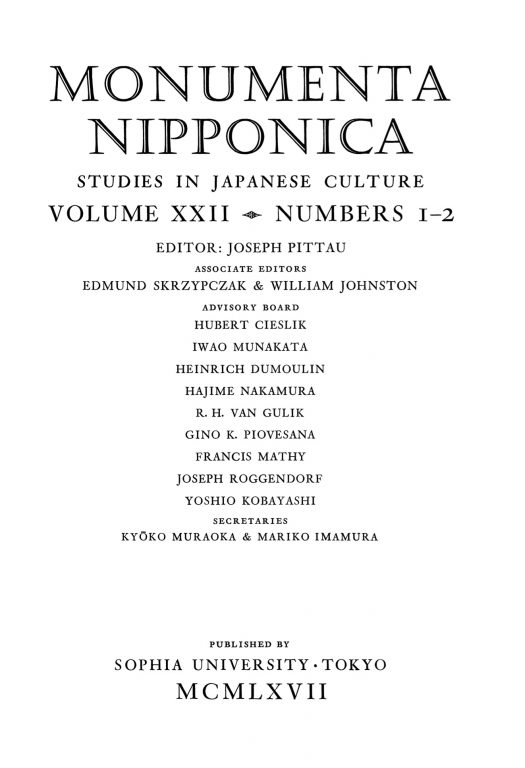 MN 22:1/2 (1967) 194–210Okina no fumi (The Writings of an Old Man)Nakamoto Tominaga, Translated by Shūichi Katō
MN 22:1/2 (1967) 194–210Okina no fumi (The Writings of an Old Man)Nakamoto Tominaga, Translated by Shūichi Katō MN 22:1/2 (1967) 211–15Yuki no yo no hanashi (A Snowy Night’s Tale)Dazai Osamu, Translated by Thomas E. Swann
MN 22:1/2 (1967) 211–15Yuki no yo no hanashi (A Snowy Night’s Tale)Dazai Osamu, Translated by Thomas E. Swann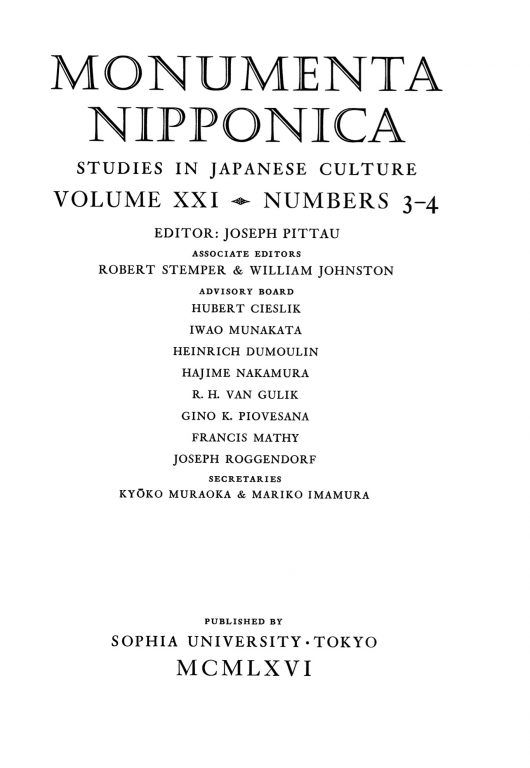 MN 21:3/4 (1966) 396–409ShukkonkyōTōkoku Kitamura, Translated by Kenneth Strong
MN 21:3/4 (1966) 396–409ShukkonkyōTōkoku Kitamura, Translated by Kenneth Strong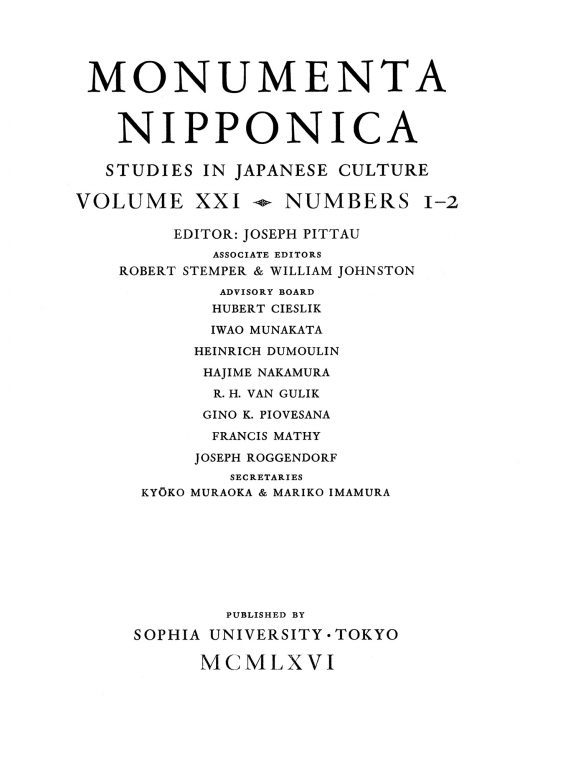 MN 21:1/2 (1966) 177–202Ugetsu MonogatariAkinari Ueda, Translated by E. Dale Saunders
MN 21:1/2 (1966) 177–202Ugetsu MonogatariAkinari Ueda, Translated by E. Dale Saunders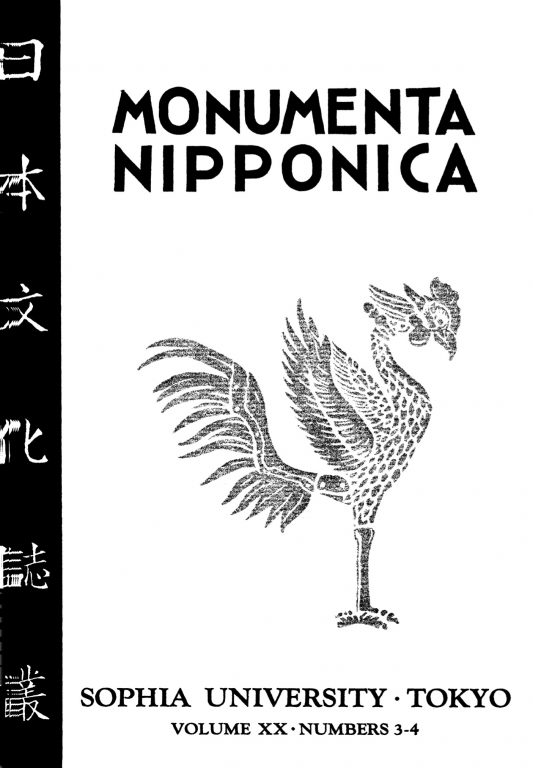 MN 20:3/4 (1965) 422–43Taga Bokkyō kun ni kotauru sho: An Answer to Taga Bokkyō Written by Miura BaienMiura Baien, Translated by Gino K. Piovesana
MN 20:3/4 (1965) 422–43Taga Bokkyō kun ni kotauru sho: An Answer to Taga Bokkyō Written by Miura BaienMiura Baien, Translated by Gino K. Piovesana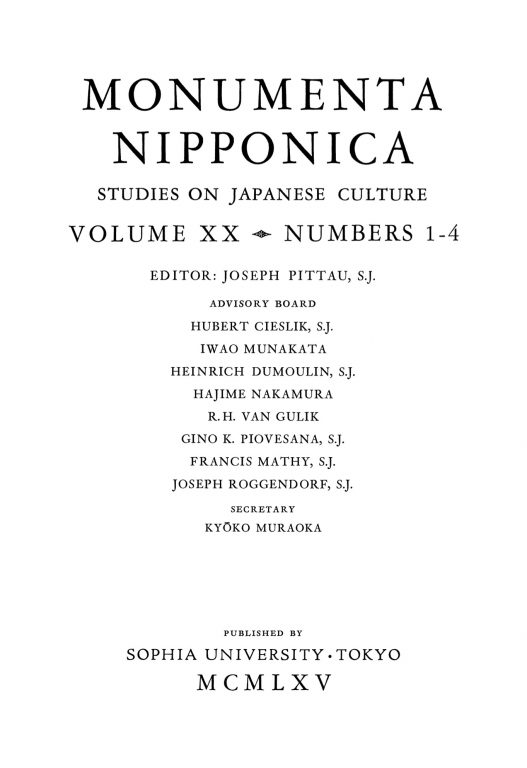 MN 20:1/2 (1965) 121–34The Vendetta of Mr. Fleacatcher Managorō, The Fifth (Kataki-uchi Nomi-tori Manako)Shigemasa Kitao and Takizawa Bakin, Translated by Leon M. Zolbrod
MN 20:1/2 (1965) 121–34The Vendetta of Mr. Fleacatcher Managorō, The Fifth (Kataki-uchi Nomi-tori Manako)Shigemasa Kitao and Takizawa Bakin, Translated by Leon M. Zolbrod MN 20:1/2 (1965) 135–208Uji Shūi MonogatariTranslated by John S. Forster
MN 20:1/2 (1965) 135–208Uji Shūi MonogatariTranslated by John S. Forster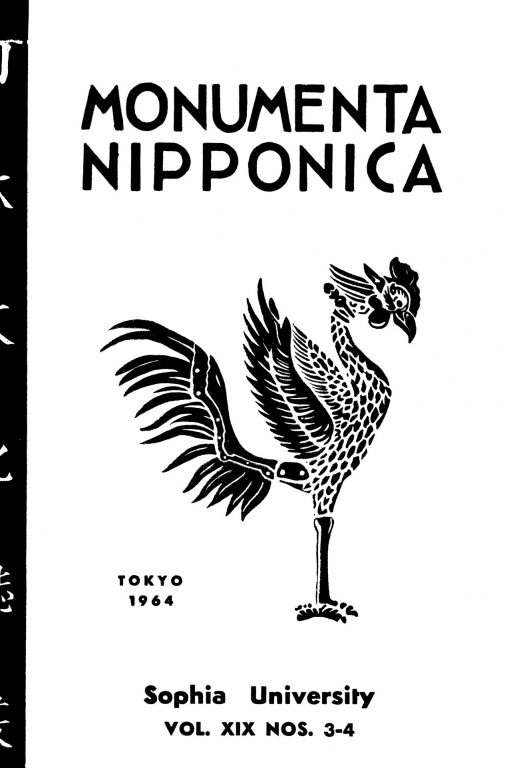 MN 19:3/4 (1964) 420–55Shōkyūki: An Account of the Shōkyū War of 1221 (Part 2)Translated by William H. McCullough
MN 19:3/4 (1964) 420–55Shōkyūki: An Account of the Shōkyū War of 1221 (Part 2)Translated by William H. McCullough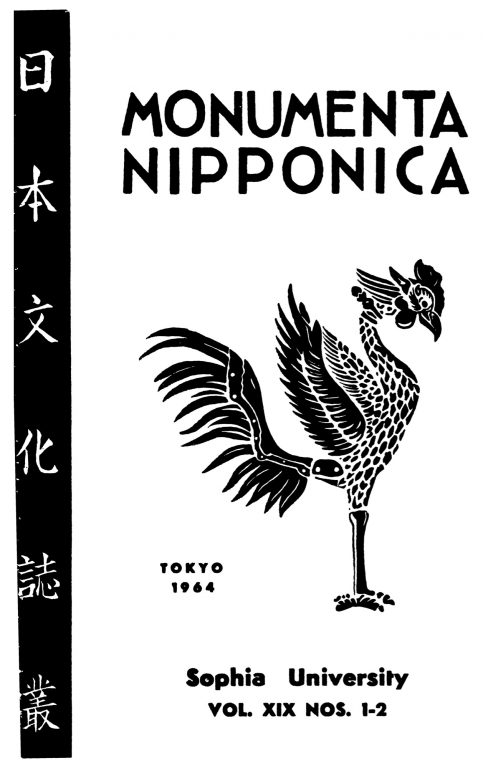 MN 19:1/2 (1964) 44–65Commentaries on the Constitution of the Empire of Japan (Part 2)Hermann Roesler, Translated by Johannes Siemes
MN 19:1/2 (1964) 44–65Commentaries on the Constitution of the Empire of Japan (Part 2)Hermann Roesler, Translated by Johannes Siemes MN 19:1/2 (1964) 169–215ShōkyūkiTranslated by William H. McCullough
MN 19:1/2 (1964) 169–215ShōkyūkiTranslated by William H. McCullough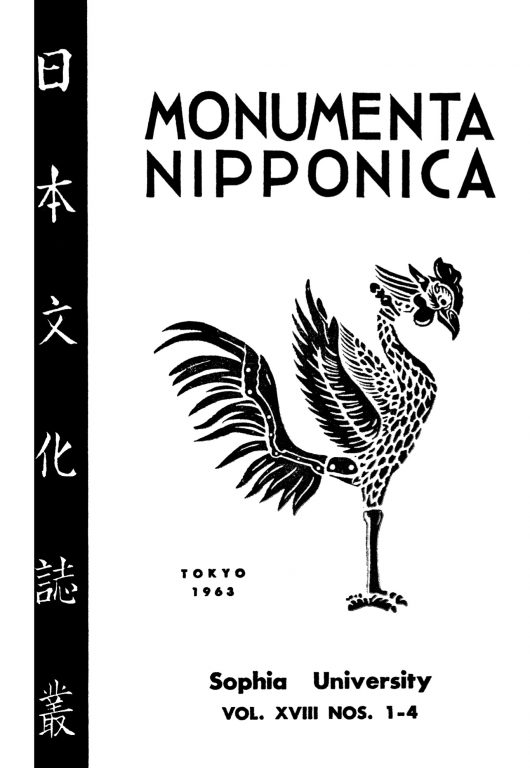 MN 18:1/4 (1963) 261–85The Nō Plays: Obasute and KanehiraZeami Kanze Motokiyo, Translated by Stanleigh H. Jones
MN 18:1/4 (1963) 261–85The Nō Plays: Obasute and KanehiraZeami Kanze Motokiyo, Translated by Stanleigh H. Jones MN 18:1/4 (1963) 297–312The Tale of Monkey GenjiTranslated by Edward D. Putzar
MN 18:1/4 (1963) 297–312The Tale of Monkey GenjiTranslated by Edward D. Putzar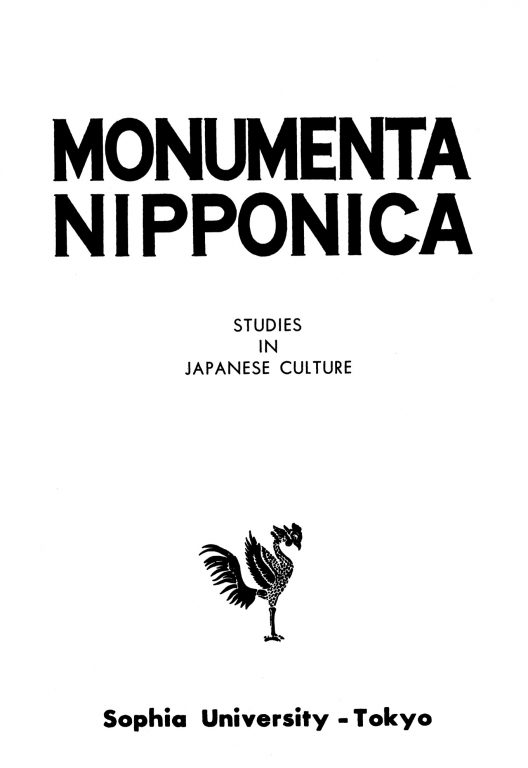 MN 17:1/4 (1962) 17–66Commentaries on the Constitution of the Empire of Japan (Part 1)Hermann Roesler, Translated by Johannes Siemes
MN 17:1/4 (1962) 17–66Commentaries on the Constitution of the Empire of Japan (Part 1)Hermann Roesler, Translated by Johannes Siemes MN 17:1/4 (1962) 279–328Part I: Recension A: Amoghapāśahrdaya-nāma mahāyānasūtraTranslated by R. O. Meisezahl
MN 17:1/4 (1962) 279–328Part I: Recension A: Amoghapāśahrdaya-nāma mahāyānasūtraTranslated by R. O. Meisezahl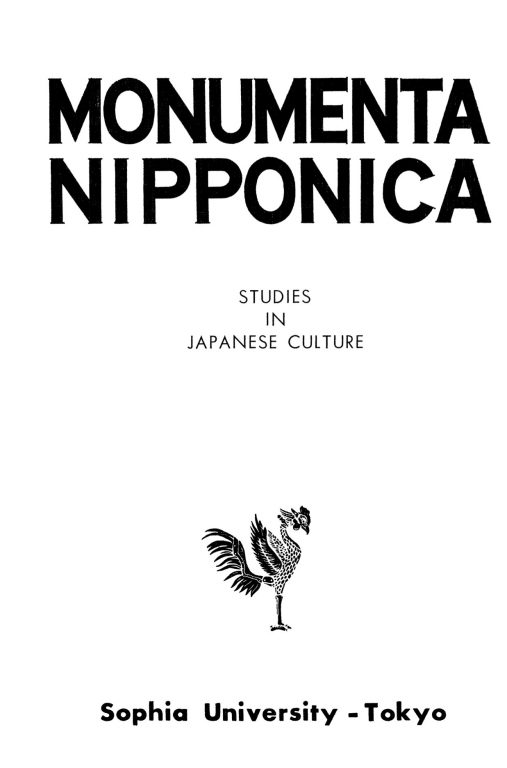 MN 16:3/4 (1961) 377–94Jūsan’ya (The Thirteenth Night): A Story by Higuchi Ichiyō (1872–1896)Higuchi Ichiyō, Translated by Hisako Tanaka
MN 16:3/4 (1961) 377–94Jūsan’ya (The Thirteenth Night): A Story by Higuchi Ichiyō (1872–1896)Higuchi Ichiyō, Translated by Hisako Tanaka MN 16:1/2 (1960) 161–95Chikusai Monogatari: A Partial TranslationTranslated by Edward D. Putzar
MN 16:1/2 (1960) 161–95Chikusai Monogatari: A Partial TranslationTranslated by Edward D. Putzar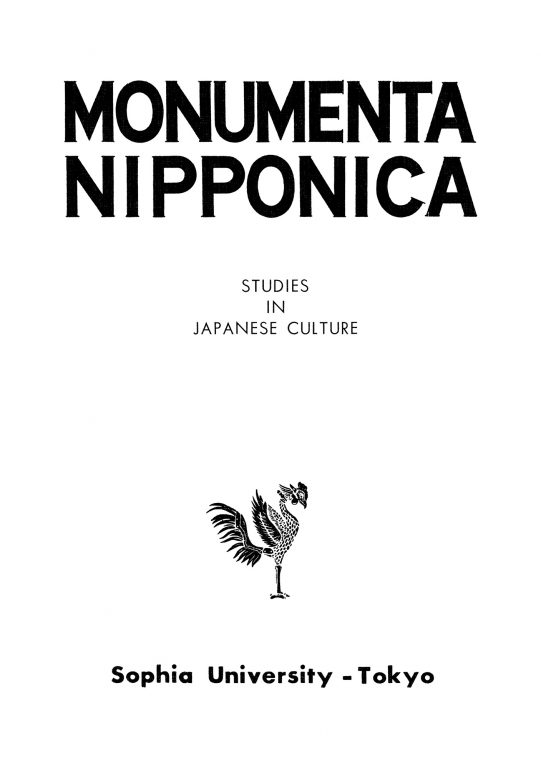 MN 15:3/4 (1959) 415–23Rōei: The Medieval Court Songs of Japan (Part 4)Translated by Eta Harich-Schneider
MN 15:3/4 (1959) 415–23Rōei: The Medieval Court Songs of Japan (Part 4)Translated by Eta Harich-Schneider MN 15:3/4 (1959) 432–40Das Buch GenjōkōanDōgen, Translated by Heinrich Dumoulin
MN 15:3/4 (1959) 432–40Das Buch GenjōkōanDōgen, Translated by Heinrich Dumoulin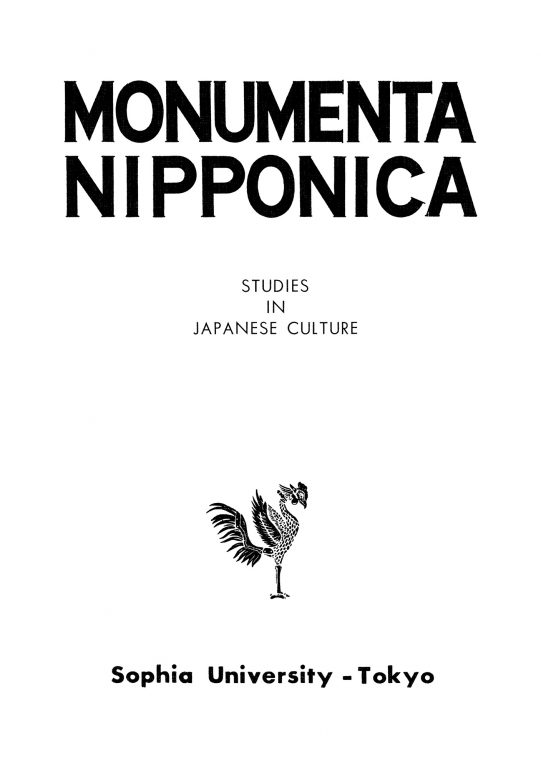 MN 15:1/2 (1959) 178–81Ein portugiesischer Brief Takayama UkonsTranslated by Johannes Laures
MN 15:1/2 (1959) 178–81Ein portugiesischer Brief Takayama UkonsTranslated by Johannes Laures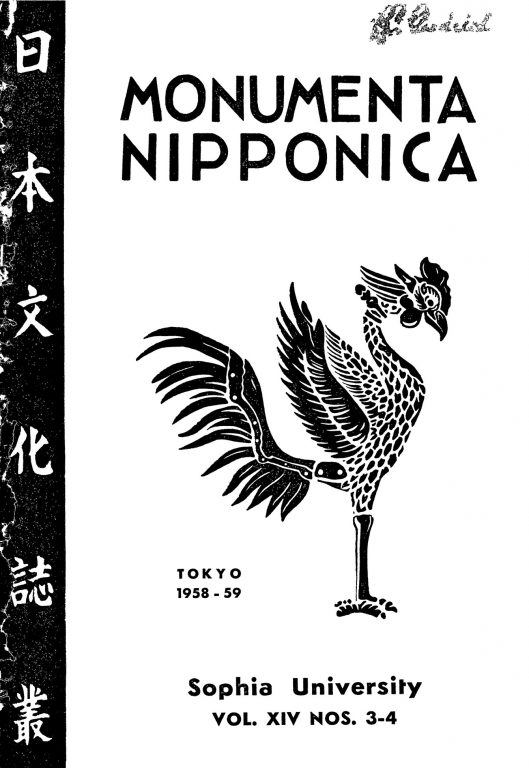 MN 14:3/4 (1958) 408–28The Special Kasuga Wakamiya Festival of 1349Translated by P. G. O'Neill
MN 14:3/4 (1958) 408–28The Special Kasuga Wakamiya Festival of 1349Translated by P. G. O'Neill MN 14:3/4 (1958) 429–36Allgemeine Lehren zur Förderung des Zazen von Zen-Meister DōgenDōgen, Translated by Heinrich Dumoulin
MN 14:3/4 (1958) 429–36Allgemeine Lehren zur Förderung des Zazen von Zen-Meister DōgenDōgen, Translated by Heinrich Dumoulin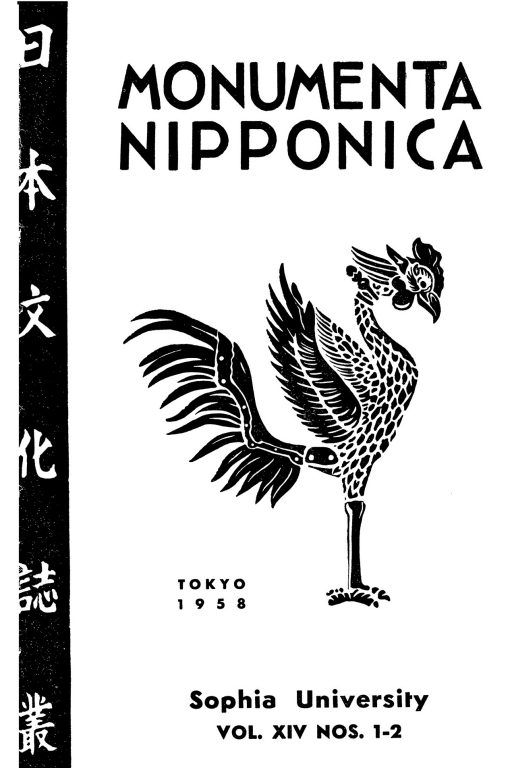 MN 14:1/2 (1958) 173–204Nigorie-Muddy Bay: A Story by Higuchi Ichiyō (1872–1896)Higuchi Ichiyō, Translated by Hisako Tanaka
MN 14:1/2 (1958) 173–204Nigorie-Muddy Bay: A Story by Higuchi Ichiyō (1872–1896)Higuchi Ichiyō, Translated by Hisako Tanaka MN 14:1/2 (1958) 205–25Takamura Mitsutarō: Chieko-Shō, Eine AuswahlMitsutarō Takamura, Translated by Daigūji Suematsu
MN 14:1/2 (1958) 205–25Takamura Mitsutarō: Chieko-Shō, Eine AuswahlMitsutarō Takamura, Translated by Daigūji Suematsu MN 13:3/4 (1957) 329–46Das Merkbuch für die Übung des Zazen des Zen-Meisters KeizanTranslated by Heinrich Dumoulin
MN 13:3/4 (1957) 329–46Das Merkbuch für die Übung des Zazen des Zen-Meisters KeizanTranslated by Heinrich Dumoulin MN 13:3/4 (1957) 350–58The RazorShiga Naoya, Translated by Francis H. Mathy
MN 13:3/4 (1957) 350–58The RazorShiga Naoya, Translated by Francis H. Mathy MN 13:1/2 (1957) 106–27Yasen Kanna: Preface to a Chat on a Boat in the EveningHakuin Zenji, Translated by R. D. M. Shaw and Wilhelm Schiffer
MN 13:1/2 (1957) 106–27Yasen Kanna: Preface to a Chat on a Boat in the EveningHakuin Zenji, Translated by R. D. M. Shaw and Wilhelm Schiffer MN 13:1/2 (1957) 139–52En no GyōjaTranslated by Hermann Bohner
MN 13:1/2 (1957) 139–52En no GyōjaTranslated by Hermann Bohner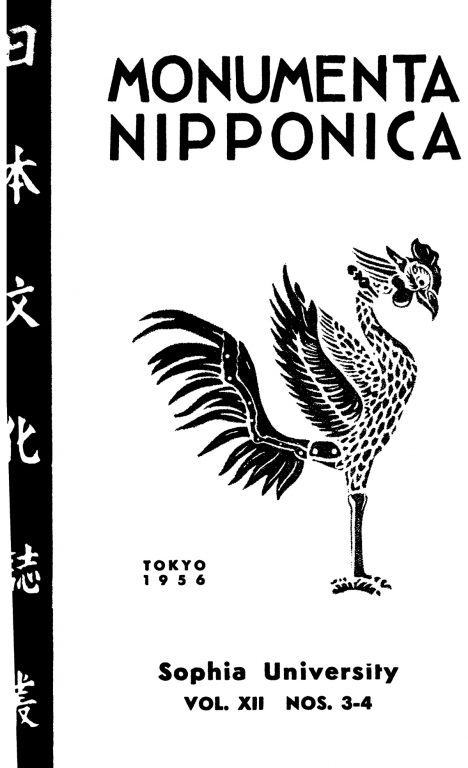 MN 12:3/4 (1956) 269–98Kamo Mabuchis Erklärung des Norito zum Toshi-goi-no-matsuri (Part 2)Kamo no Mabuchi, Translated by Heinrich Dumoulin
MN 12:3/4 (1956) 269–98Kamo Mabuchis Erklärung des Norito zum Toshi-goi-no-matsuri (Part 2)Kamo no Mabuchi, Translated by Heinrich Dumoulin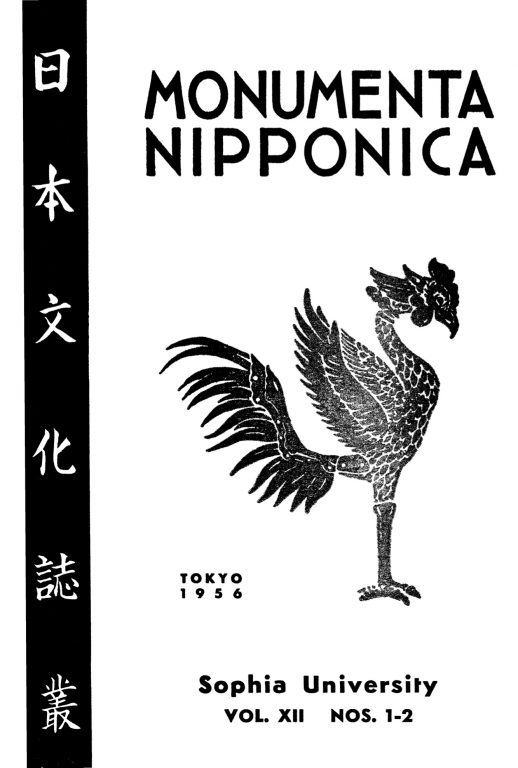 MN 12:1/2 (1956) 121–56Kamo Mabuchis Erklärung des Norito zum Toshi-goi-no-matsuri (Part 1)Kamo no Mabuchi, Translated by Heinrich Dumoulin
MN 12:1/2 (1956) 121–56Kamo Mabuchis Erklärung des Norito zum Toshi-goi-no-matsuri (Part 1)Kamo no Mabuchi, Translated by Heinrich Dumoulin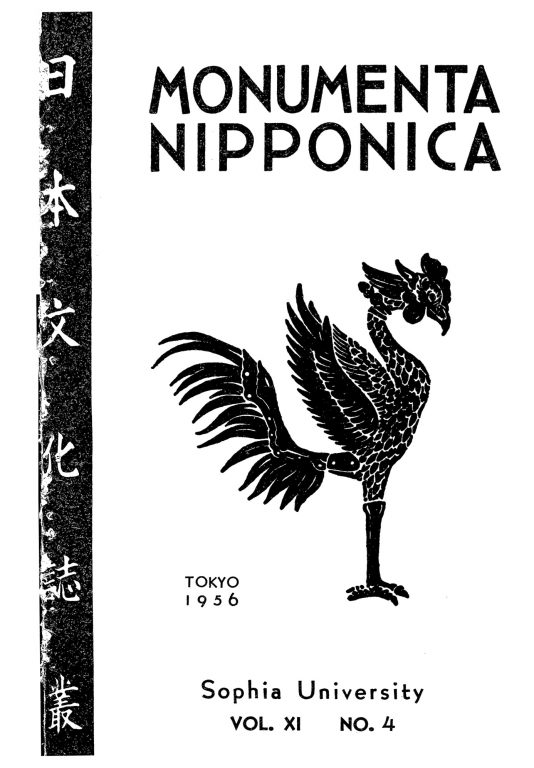 MN 11:4 (1956) 329–55The Tale of the Bamboo CutterTranslated by Donald Keene
MN 11:4 (1956) 329–55The Tale of the Bamboo CutterTranslated by Donald Keene MN 11:3 (1955) 268–83Zwei Texte Kamo Mabuchis zur Wortkunde (Part 1)Kamo no Mabuchi, Translated by Heinrich Dumoulin
MN 11:3 (1955) 268–83Zwei Texte Kamo Mabuchis zur Wortkunde (Part 1)Kamo no Mabuchi, Translated by Heinrich Dumoulin MN 10:1/2 (1954) 203–26The Nō Plays: Koi no Omoni and YuyaTranslated by P. G. O'Neill
MN 10:1/2 (1954) 203–26The Nō Plays: Koi no Omoni and YuyaTranslated by P. G. O'Neill MN 10:1/2 (1954) 227–69A Chapter on Reality From the Madhyāntavibhāgaçāstra (Part 2)Translated by Paul Wilfred O'Brien
MN 10:1/2 (1954) 227–69A Chapter on Reality From the Madhyāntavibhāgaçāstra (Part 2)Translated by Paul Wilfred O'Brien MN 10:1/2 (1954) 270–76An Early Manchu-Chinese Patent of NobilityTranslated by John L. Mish
MN 10:1/2 (1954) 270–76An Early Manchu-Chinese Patent of NobilityTranslated by John L. Mish MN 9:1/2 (1953) 54–61Mabuchis Einleitung zum Manyō-kōKamo no Mabuchi, Translated by Heinrich Dumoulin
MN 9:1/2 (1953) 54–61Mabuchis Einleitung zum Manyō-kōKamo no Mabuchi, Translated by Heinrich Dumoulin MN 9:1/2 (1953) 284–303A Commentary on Discrimination Between the Mean and Extremes By the Bodhisattva Vasubandhu, Translated Under Imperial Command by Hsüan Tsang Tripitaka Master of the T’ang Dynasty, Chapter the Third: A Discussion of Reality (Tattva)Translated by Paul Wilfred O'Brien
MN 9:1/2 (1953) 284–303A Commentary on Discrimination Between the Mean and Extremes By the Bodhisattva Vasubandhu, Translated Under Imperial Command by Hsüan Tsang Tripitaka Master of the T’ang Dynasty, Chapter the Third: A Discussion of Reality (Tattva)Translated by Paul Wilfred O'Brien



























